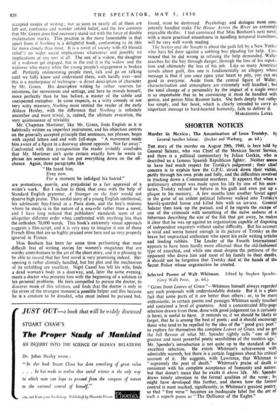SHORTER NOTICES
THE story of the murder on August 20th, 1940, is here told by General Salazar, who was Chief of the Mexican Secret Service, and there is a political commentary by Julian Gorkin, who is described as a famous Spanish Republican fighter. Neither seems to have had much respect for Trotsky's judgement ' • their chief concern is to explain how the G.P.U. struck down their victim, partly through his own pride and folly, and the difficulties involved in tracking down a Communist murderer. It appears that when preliminary attempt was made upon his life by one of his secre- taries, Trotsky refused to believe in his guilt and even put up a plaque to his memory. A few months later another Soviet agent in the guise of an ardent political follower walked into Trotsky's heavily-guarded house and killed him with an ice-axe. General Salazar then took up the pursuit. and if he regrets the escape of one of the criminals with something of the naive sadness of a fisherman describing the size of the fish that got away, he makes it clear that he was up against an organisation capable of disposing of independent enquirers without undue difficulty. But his account is vivid and seems honest enough in its picture of Trotsky as the brave but unpractical enthusiast who spent his exile writing articles and feeding rabbits. The Leader of the Fourth International appears to have been hardly more effectual than the old-fashioned type of anarchist, and while one must despise the pettiness of the opponent who drove him and most of his family to their deaths, it should not be forgotten that Trotsky died at the hands of the Secret Police whose organisation he created.






































 Previous page
Previous page